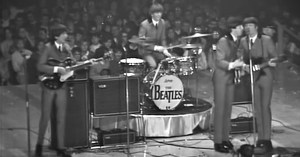Instructor Gideon of LetThemTalkTV explains why British English and American English say the word “tomato” differently but not the word “potato”, unlike the famous song, due to “The Great Vowel Shift”.
The pronunciation of tomato and potato tells us a lot about the history of English and its irregular spelling. In this video we’ll look at the great vowel shift and other influences on English pronunciation.
The Great Vowel Shift (GVS) took place primarily between 1400 and 1700 and essentially changed the pronunciation of the English language. The timing makes a difference as those words that changed within the GVS provided for similar pronunciations across the English language, while those outside the GVS were open to interpretation.
So before the great vowel shift, it would have been pronounced like “potahto” after the Great Vowel Shift. It gets changed to “potayto”. What about tomato? Well, tomato came into English from Spanish in 1753. That’s too late for the Great Vowel Shift. So it was fixed as “tomato”; however, there was a kind of mini vowel shift in the 18th century in and around London. Remember, the vowels are always changing to a lesser or greater degree. And this changed some vowels and some words and imitated earlier phonetic changes.






